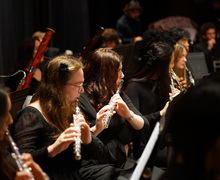SU hosts talk on anti-oppressive educational approaches to neurodivergent students
Cassandra Roshu | Asst. Photo Editor
Dr. Nick Walker and Director of CDI Christine Ashby participated in Tuesday’s discussion held by Syracuse University’s Center on Disability and Inclusion. The two speakers discussed anti-oppressive educational approaches, the Neurodiversity at SU initiative and faculty training.
Get the latest Syracuse news delivered right to your inbox.
Subscribe to our newsletter here.
In 2004, Dr. Nick Walker implemented the term “neurominority.” While the term neurodivergent broadly covers acquired conditions like Post Traumatic Stress Disorder, the term neurominority is specific to conditions that don’t necessarily make a person’s brain different, but are still a disability.
On Tuesday, Walker was part of a virtual talk held by Syracuse University’s Center on Disability and Inclusion to discuss anti-oppressive educational approaches to teaching and accommodating neurodivergent students.
Walker, who is a professor of psychology at the California Institute of Integral Studies, said in the context of education, the term neurominority extends to students with conditions like autism, ADHD and dyslexia who are often restricted through lack of accommodation.
Christine Ashby, director of CDI, opened the event with a discussion on the Neurodiversity at SU initiative, which focuses on working with SU students with autism or who are otherwise neurodivergent to improve their experiences on campus.
Ashby said that when she’s spoken with students about what they want to see on college campuses, she’s found four goals to be consistent: improve campus climates, provide opportunities and spaces to connect with other neurodivergent students, expand educational opportunities and hire more staff with training to meet needs.
“They want faculty and staff to build the capacity of faculty and staff understanding of the experiences of neurodivergent students, and strategies and supports and ways to make our campus not just accessible, but a more supportive space,” Ashby said.
Walker said she wanted to focus specifically on faculty and staff training, saying a significant proportion of mistakes in curriculum stem from a lack of resources or understanding.
You’re here for the classes and the education, so if the content of the classes in education is hostile to people like you, it doesn’t matter how welcoming the rest of the climate is.Dr. Nick Walker
She said a school can have well-intentioned educators and diversity and inclusion centers that aim to make neurominority students more comfortable, but when those students are in classroom environments, they may hear people with their own conditions being discussed in dehumanizing ways through lectures and readings.
“You’re here for the classes and the education, so if the content of the classes in education is hostile to people like you, it doesn’t matter how welcoming the rest of the climate is,” Walker said.
She said issues aren’t typically the fault of individual faculty and staff members, but oppressive language in university curriculums can be impactful and difficult to change.
Academic communities are just beginning the process of making neurodivergent curriculum less oppressive, Walker said. She added the first step is to ensure that works about a neurominority topic are written by a neurominority-identifying person.
When educators assign readings that describe a minority group, she said, they should consider how that language would be received if applied to a separate minority group to determine its true inclusivity.
“If they can apply that diligently, that’s an eye opener,” Walker said. “And that’s the key to making the shift for a better curriculum.”
Published on April 5, 2023 at 12:52 am






